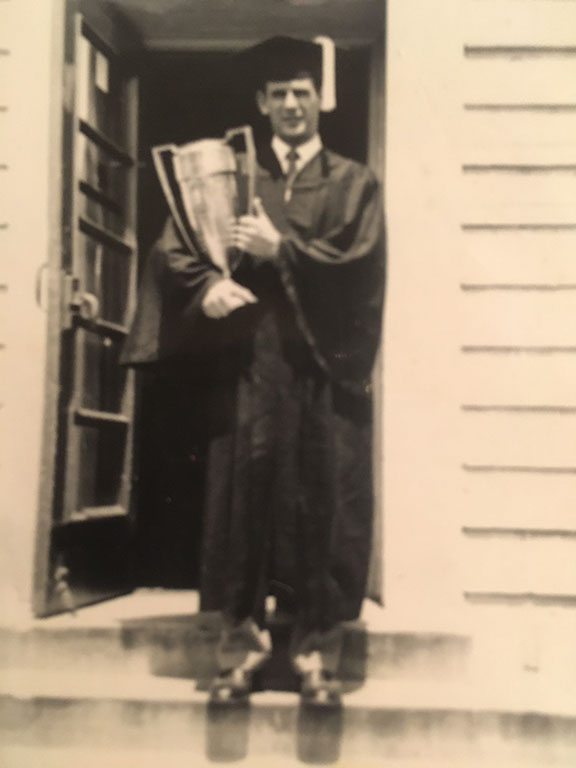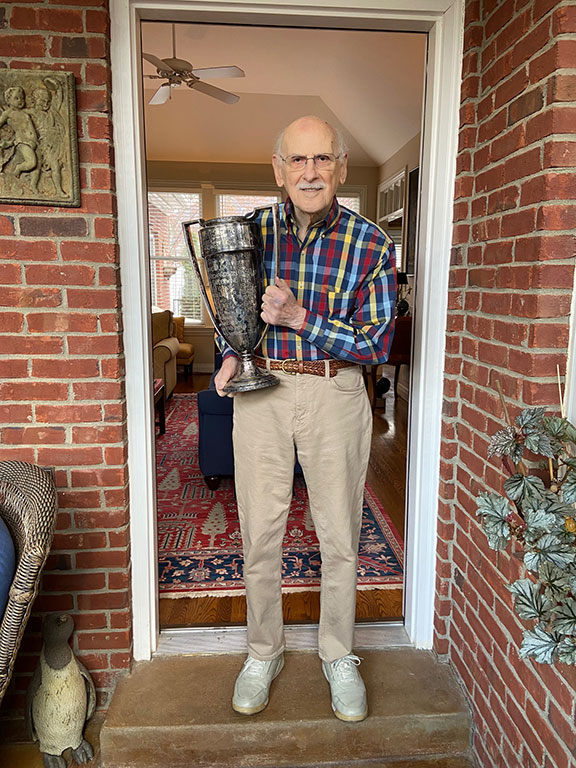As the winner of the 1951 Sigma Delta Chi Outstanding Senior Journalist Award, Bernie Rosenthal’s name was inscribed on this trophy which listed winners from 1926-1952. He reached out to The Media School 71 years later to see if IU still had the trophy, and recreated his senior year photo.


Bernie Rosenthal, BA’51, speaks with the same fondness for his years as a waiter at the Delta Zeta sorority house as he does his years as a covert member of the Central Intelligence Agency traveling the world — just two of the adventures he has taken on in his 94 years.
Rosenthal’s epithets include: veteran, journalist, adjunct professor, business manager, marketing consultant, CIA employee, leader and more. He has used his skills to become a communicator across all media to reach people all around the world.
“I really wasn’t sure what I wanted to do as I looked at my career on campus,” Rosenthal said. “For some reason, journalism kind of tweaked in my mind. I like words and communications.”
That affinity for wordsmithing led Rosenthal across the country and then the world.
His career began before he attended IU and only grew from Bloomington. He served as a Marine in the South Pacific during World War II before attending IU thanks to the GI Bill.
At IU, he worked at the library, as a waiter at Delta Zeta (“a wonderful job,” he said), as a journalist for the Indiana Daily Student, as a mentor on campus and as a member of the Board of Aeons.
“I thought maybe I was in trouble because I had a lot of parking tickets,” Rosenthal said, recounting how then-President Herman B Wells asked him to come to the president’s office for a discussion. The meeting was actually an invitation to join the prestigious 12-member student research and advisory organization that works with the university president.
His final year at IU, Rosenthal won an Outstanding Senior Journalist Award for exemplary reporting. He took the trophy he received in recognition to a local bar, filled it with beer several times and shared it with his friends from the IDS, Rosenthal remembered in part of an IU Century of Journalism project.
In the early ‘50s, employees of a local manufacturer of television and technical equipment were on strike. The union was meeting privately at a community school to discuss a potential agreement. Rosenthal arrived two hours ahead of the scheduled meeting time, went to the second floor and hid in one of the school rooms.
“The place was loaded with union workers,” Rosenthal said. “And they said, ‘Let’s be sure there are no journalists here.’”
Rosenthal heard the entire discussion.
The union workers agreed to sign a contract — a controversial decision, he said — and leaders passed out papers delineating the final agreement.
“Everyone cleared out, and I thought, ‘Maybe I’ll be lucky, maybe someone might have left one on the floor,’” Rosenthal said. “And sure enough, the place was completely void of any paperwork except one.”
He had gotten lucky.
“I dashed back to the Daily Student,” Rosenthal said. “We broke the story ahead of the Indianapolis Star, and they could not figure out how this kid at IU could have done that.”
After graduation, he took his reporting skills to New Albany, Indiana, before joining the General Electric Company. He was the fourth employee hired at GE’s new Louisville appliance manufacturing complex, where he started the GE Works News using his talents as a writer, reporter and photographer.
Next, he headed to the “Bingham family empire,” which owned The Louisville Courier-Journal, The Louisville Times and a communications complex of television and radio.
“I knew all about how newspapers functioned,” Rosenthal said. “I got into management in advertising, management in corporate research and long-range planning.”
He served as an adjunct professor of marketing at the University of Louisville School of Business, was named an adopted alumnus of the university and worked in academia for more than 20 years.
Rosenthal is passionate about community involvement, he said. He was the board chair of the Kentucky Derby Festival, president of the Society of Professional Journalists and president of the Advertising Federation of Louisville, and conducted volunteer work for numerous nonprofits.
His next career move was to the television and broadcast end of the business.
Rosenthal learned to write scripts, direct and produce, and he served as the business manager of a TV station and two radio stations for about 11 years.
“By that time, I was quite happy,” he said.
Rosenthal then reconnected with an old friend from IU, Dick Garver, BA’51. Garver had become chair of the journalism department at the University of South Dakota before his selection as a Fulbright Scholar and addition to the CIA’s Operations Directorate.
“While on campus, we kind of became like brothers,” Rosenthal said. “We liked each other, we liked what we thought about life and journalism and what have you.”
Garver came to Louisville to see Rosenthal around his 11th year in the broadcast business. Garver asked if Rosenthal had ever thought about leaving this country, he said, and invited him on a trip to Spain that summer.
“It looked like something out of Hollywood,” Rosenthal said of his time visiting a villa located in Mallorca, Spain. “He introduced me to some people. We had a lot of fun — we talked about the industry, the world.”
When they got back, Garver told Rosenthal he was going to mail him something. “‘See if you like it,’” Garver told Rosenthal.
The enigmatic mail was an offer from the CIA, he said.
Rosenthal, his wife Jane and daughter moved to Fairfax, Virginia, so Rosenthal could begin what he calls “unique communications work for the agency.”
Rosenthal spent about 80 percent of his time overseas, working across Asia, South America and Europe.
He met presidents of foreign countries and used his journalism ability to do work involving all types of print and broadcast media, he said.
After about 10 years, Jane’s mother became ill, and the two moved back to Louisville. There, Rosenthal returned to work in television — serving as general manager and eventually the president of the first Black television station in Kentucky — and in his community.
He joined the Marine Corps Coordinating Council as director, garnering donations for the Semper Fi Fund designated for the widows and children of those wounded or killed during Marine service.
On the board of the organization for 11 years, Rosenthal helped the fund reach nearly $2 million.
Rosenthal also served as a marketing consultant for a photography agency for about two decades.
His tenacity and dedication are not limited to his career, though.
“When I was 79, I did finish the Kentucky Derby Festival Mini Marathon,” Rosenthal said. “[In March] I’ll be celebrating my 94th birthday. It's been an incredible journey.”

